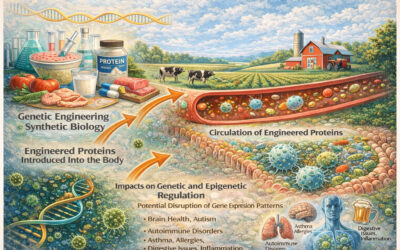Many Factors Fuel Demand for Transformation of Our Food System
by Melissa Diane Smith
At-A-Glance
- A convergence of factors is fueling increasing demand for regenerative change in our food system.
- There is recognition and acceptance that we have a problem with poor soil health.
- Improving soil health is a unifying and galvanizing topic that gets people engaged and willing to act. Farmers see results that improve their bottom line.
- There is a need for the American people to get involved, band together, and speak to their elected officials to support and promote regenerative agriculture, which is focused on soil health.
In a multi-disciplinary online conversation about glyphosate, the world’s most widely used pesticide, a panel of five experts said there is a convergence of factors fueling more people from all walks of life wanting to see a profound transformation of our food system from pesticide-based industrial to soil-health based regenerative agriculture.
Factors Fueling Demand for Regenerative Change
The factors include:
- Loss of soil health
- Loss of water quality
- Loss of air quality
- Loss of biodiversity
- Rising food prices
- More frequent shortages of specific types of food
- An increase in chronic health problems in humans that correlates with the dramatic increase in the use of glyphosate and other herbicides since the introduction of herbicide-resistant genetically modified foods in 1996
- An increased risk of serious health problems including cancer that are linked to the use of glyphosate and other pesticides in farmers, farmworkers, groundskeepers, landscapers, and others
U.S. Senator Cory Booker who sits on the Senate Committee on Agriculture, Nutrition, and Forestry said that many people simply aren’t aware that we have “a food system that is broken for everyone.” He feels that we are at a crisis point in America where one out of every three U.S. government dollars right now are spent on health care, and our country has what he terms “outrageous” amounts of diet-related diseases. In addition, the United States has a little more than 4 percent of the global population, but it uses about 20 percent of the world’s usage of pesticides. Many of the pesticides used are so harmful to health that they are banned in the European Union. Polling reveals that more people than ever want fewer pesticides in their food, and because of the Covid-19 health issue in the last few years, more people realize the importance of taking action to dramatically improve their health.
Even from the viewpoint of conventional farmers, current economic factors are making it difficult to stay in business. The market prices of many pesticides and other chemical inputs have risen to extreme levels, and continued use of pesticides leads to the development of hard-to-get-rid-of super-weeds, super insects, loss of soil health, and loss of water retention in the soil; all of which drain financial resources often to the breaking point. Six thousand to 8000 family farms are lost every year.
Never have we had more awareness that we need fundamental change in our food system, said Zach Bush, MD, an integrative medicine physician and thought leader on how food systems relate to health and disease.
The discussion entitled “Context and Convergence: A Dialogue on Glyphosate, Human and Planetary Health,” was moderated by investigative journalist Carey Gillam and organized by Farmer’s Footprint, a coalition of farmers, educators, doctors, scientists, and business leaders. This collaboratory of thought leaders came together to expose the human and environmental impacts of chemical farming and offer a path forward through regenerative agricultural practices. To view a replay of the discussion that took place on July 19, 2022, click here.
Improving Soil Health is a Unifying Topic
The solution to the many problems with our food and agricultural system and medical (sick-care) system literally lies right underneath our feet. There is an urgent need to focus on improving soil health and a willingness, eagerness, and ability to do it.
About two tons of topsoil are now lost from every single acre in the United States per year, according to Dr. Bush. The solution is to “…build an education and toolbox system in which our farmers can be supported in their transition to a non-chemical-dependent agricultural system,” he explained.
Calla Rose Ostrander, an agricultural policy strategic advisor to the state of California, agreed, saying there is recognition and acceptance that we have a problem with poor soil health. Improving soil health is a unifying and galvanizing topic that gets people engaged and provides farmers positive results, even when they start taking just small steps.
“We’re talking about improving (farmers’) bottom line in the short term and long term,” said Matt Nicoletti, Director of Business Development for Penny Newman Grain Co., an international grain and feed ingredient company. Toward that end,
his company helps growers use simple and obtainable methods to make incremental changes in soil health and soil structure over time. By doing this, the company essentially helps farmers take steps to move toward regenerative agriculture without their even knowing they’re doing that, and farmers see both soil fertility and financial benefits from making those changes.
The Need for More Awareness and Engagement
Sen. Booker said it’s important to help raise awareness of our broken food system and to join with others to form a coalition to band together to fix it through a focus on soil health. Two of the bills he has introduced include the following:
- Protect America’s Children from Toxic Pesticides Act, which would ban dangerous pesticides including glyphosate
- Climate Stewardship Act, which would help support farmers to transition to regenerative agricultural practices that focus on soil health.
ACTION ITEM
However, he said: “Change doesn’t come from Washington. Change comes to Washington.” So, the American people need to do their part and get involved, speak up, and demand that elected officials support bills and enact laws that support regenerative agriculture in the United States.
Melissa Diane Smith is a respected author, health journalist, holistic nutritionist, and advocate for health-promoting real food.



